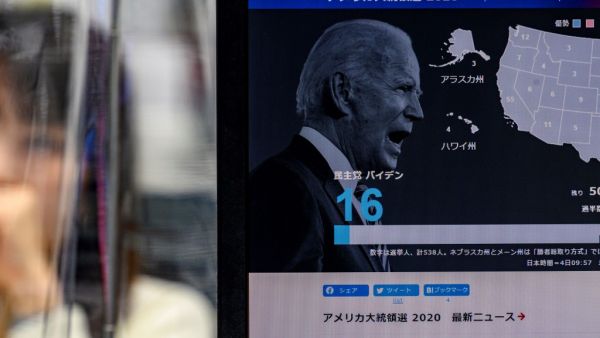Democrats and Republicans found themselves in a nail-biter election Tuesday night – as Joe Biden's hopes of flipping Florida, Ohio, North Carolina and Texas in a knockout blow faded rapidly.
Instead the focus turned to the mid-west and the 'blue wall' lost by Hillary Clinton, instead of the landslide which had initially seemed was on its way.
The final pre-election polls had shown Biden holding consistent but narrow leads across the range of battleground states.
If that had been followed, the candidate had a chance of scoring an early blow in the four target states which could have sent the signal of a big win to come.
Instead, four hours after the first polls closed, the campaigns were preparing for what looked more like a night of trench warfare, with Trump chipping away at Biden's early lead as more votes came in and moving ahead in Florida, Ohio and Texas. In North Carolina there was just one point in it.
After some early disappointments, Biden's clearest path to victory appeared to be the one Democrats carved out at the start of the cycle: flipping rust belt battlegrounds in Michigan, Pennsylvania, and Wisconsin that Trump carried four years ago.
The scenario remained achievable, but also susceptible to failing should a Biden stronghold suddenly fall into Trump's camp.
But that guarantees a long wait for results.
Adding to the confusion and drama of the evening, each state counted its votes differently – with some running through early votes quickly, and others starting with Election Day votes, and mail-in ballots continuing to be the wild card.
The first sign of trouble for the Democrat began with disappointing vote totals coming in from Miami-Dade County in Florida. Biden ran ahead of President Trump there – but was only up 53 to 46% with 95% of precincts reporting.
That wasn't enough to match Hillary Clinton's totals, and didn't appear to be enough to offset Trump advantages in other rural parts of the state. It was a sign that Biden hadn't done what he needed to do to lock down support among the state's many Cuban-American, Venezuelan-American, and other Hispanic voters.
Improvements over Clinton's numbers outside Tampa and around Jacksonville might not be enough to make up the difference, and the state was too close to call with 94% of precincts reporting, although Trump was holding on to a narrow lead.
Florida has a long history of close elections and contested counts, and networks were loath to make final calls even with Trump leading 51 to 48 with 94% of precincts reporting.
Even if Florida went the other way, Biden's camp turned to a new opportunity in Ohio, a Republican-leaning state. Polls have showed a tight race there, but there were some signs Tuesday it could be aligning with Michigan and Pennsylvania, where Biden built up poll leads.
Biden was running up big margins in Cuyahoga County, which includes Cleveland. He also was up initially in suburban Lake County outside the city, although Trump then seized the lead as the night wore on. The state appeared to be going through early votes first, followed by Election Day ballots, although mail-in ballots have days to come in.
Recognizing the potential importance of the state, Biden made a final visit to Cleveland Monday.
Industrial Ohio strongholds like Mahoning County showed Biden out-performing 2016 candidate Hillary Clinton.
North Carolina, another Trump state from 2016, provided Biden with another tantalizing opportunity, and the Democrat seized the lead there in the initial vote.
Biden was running up big totals around Charlotte and Greensboro. But Trump clawed his way back, and seized a narrow lead, 50 to 49%, with 89% of precincts reporting.
Here again, early votes were expected to come in first.
An early lead for Biden in Texas also slipped away, with Trump leading 51 to 47 with 80% of precincts reporting.
None of those state results were final, and there were also encouraging signs for Biden, including outperforming Clinton in some suburban areas that were key to Trump's victory.
Biden's camp could still look to the 'blue wall,' and votes were slower to come into Pennsylvania, Michigan and Wisconsin, although Trump was leading in all three in the early count.
In a sign that Democrats' vast fundraising had failed to bring about success, the $100million spent by Jaime Harrison to unseat Lindsey Graham in South Carolina failed, with the Republican winning by a projected margin of as much as 10 points.
'WE ARE LOOKING REALLY GOOD ALL OVER THE COUNTRY. THANK YOU!' Trump tweeted early Tuesday evening before the votes came in, after sounding hoarse and tired in an early morning radio interview and scheduling a quick visit to his campaign headquarters Tuesday.
Trump held an early lead in Michigan, leading 55 to 44 with 38% of precincts reporting.
But less than a third of the vote was in in vote-rich Wayne County, which includes Detroit. Biden was up 52 to 47 in Oakland County outside Detroit with 58 per cent of the vote in.
Arizona, another prize, remained very much in play. With three-quarters of the vote counted, Biden was leading Trump 54 to 45. However, early in-person and mail-ballots were expected to come in first, providing Trump a chance to gain ground.
Trump was leading by 2 percentage points in Wisconsin with 40 per cent of the vote counted.
With votes being counted there was nothing for the two candidates to do but wait.
President Trump is watching returns in upstairs residence of the White House with family and close advisers. Downstairs in the East Wing, Trump supporters watched returns on TV screens showing Fox News and snacking on fast food, including French fries and hamburgers.
Biden is at his home in Wilmington, watching returns with his family.
Trump won eight electoral votes from Kentucky, five from West Virginia and 11 from Indiana, while Biden took three for Vermont.
Arizona, Iowa, Georgia, Florida, Michigan, North Carolina, Pennsylvania, Texas and Wisconsin are among the states to watch.
The winner of some of those states may not be known for days. The Supreme Court extended deadlines in North Carolina and Pennsylvania for officials there to accept mail-in ballots, a blow to Republicans.
Trump, in particular, has railed against the Pennsylvania decision and has threatened legal action in the state against any disputed ballots.
It's unclear how Trump will win a second term with Florida and Pennsylvania.
It takes 270 electoral votes to win the presidency.
'We believe this to be a tight race,' Trump campaign manager Bill Stepien said Tuesday evening on a call with reporters. 'We believe every votes going to matter. It's going to come down to turnout. We think we're better positioned in that sort of in that type of campaign.'
There have been reports of long lines at polls across the country. As long as voters are in line by the time polls close, they are allowed to vote.
Biden refused to say how the night will go, telling reporters Tuesday outside a Delaware community center that he's 'superstitious' about offering predictions but remains 'hopeful.'
'The things that are happening bode well for the base that has been supporting me -- but we´ll see,' he said.
But he noted things were 'so uncertain' because of the large number of states in play.
Biden and Trump were switching back and forth between having the lead in Florida, though early totals out of Miami-Dade seemed to spell trouble for Biden, as Trump has heavily courted the Latino population, particularly in Miami's Cuban communities.
He held a midnight rally in the Miami area on Sunday, which attracted an estimated 12,000 supporters.
CNN was reporting that Biden was underperforming Clinton's totals in Miami-Dade by more than 5%.
Palm Beach County and Broward County, located north of Miami, looked like more fertile ground for Biden. Hillsborough County and Pinellas County, where Tampa and St. Petersburg are located, respectively, had Biden overperforming how Clinton did in 2016.
In Florida, a machine recount is triggered when the margin between the candidates is less than or equal to .5% of the total votes.
Senate Majority Leader Mitch McConnell scored the first important win of the election night, with networks calling his race for reelection soon after the polls closed in Kentucky.
It was a result that political experts had forecast – but it dashed the hopes of Trump 'resistance' members who poured contributions into the race in hopes of turning back a prime facilitator of the president's agenda.
McConnell, the architect of the strategy to push through a quick confirmation for Supreme Court Justice Amy Coney Barrett, was leading Democrat Amy McGrath 56% to 40%, with about two-thirds of the state's vote counted.
McConnell, who also helped push through Trump's tax cuts and confirmed a raft of appeals court judges, also designed the strategy to block President Barack Obama's Supreme Court nomination of Merrick Garland.
What is still unknown is whether he will return to the Senate next year as majority leader or as minority leader – with Democrats holding a decent chance of taking over the chamber, where Republicans hold a 53 to 47 edge.
He won in a what was looking to be a difficult year for incumbent Republicans after spending 36 years in the Senate, defeating McGrath, a former Marine fighter pilot, as President Donald Trump carried the state.
Democrats made McConnell a top target even with ample other opportunities on the map, funneling $88 million to McGrath and shattering records compared to $55million for McConnell, a proven fundraiser.
Both Biden and Donald Trump have been eyeing Pennsylvania as one of the key swing states in the White House race.
Pennsylvania accounts for a significant 20 electoral votes meaning both Republicans and Democrats - as well as pollsters - believe the outcome of the state could dictate the entire race.
Concerns are mounting that Trump will declare victory in the state long before votes are counted or that he will attempt to stop mail-in votes being counted after election day.
Democrats are thought to be more likely to vote by mail-in voting given Trump's constant rhetoric that the process is 'rigged'.
Colorado Senator Cory Gardner became the first major political casualty Tuesday night, after former governor and Denver mayor John Hickenlooper defeated him.
Gardner was considered one of the most endangered Republican incumbents on the ballot Tuesday, running in a state where Joe Biden was running strongly against President Trump.
His defeat would take the GOP's narrow Senate majority down to 52 votes – however should Republicans knock off Alabama Democratic Sen. Doug Jones it would be a wash.
Gardner trailed Hickenlooper in opinion polls going into election day, and Hickenlooper overcame some of his own stumbles after he was forced to pay a state ethics fine. He ran for president this year and stumbled, but was considered a top Democratic prospect in his state.
Like other Senate Republicans, Hickenlooper became tied to Trump, who was viewed negatively in the state. Although he once criticized Trump during the 2016 campaign after the 'Access Hollywood' tape, Gardner, a former leader of his party's campaign wing, didn't put much distance between himself and the president.
He said he thought Trump was moral and ethical when asked about it during a candidates' debate. 'I wish he could be more specific in his communications with the American people,' Gardner added.
Trump won the state by less than a point over Hillary Clinton back in 2016 however the latest polls show Biden is ahead by around 5 points.
Biden has visited the state more times than any other battleground state during his campaign trail and Trump has also focused heavily on drumming up support in the state.
Democrats scored their first big win of the night Tuesday when they knocked off incumbent Republican Sen. Cory Gardner in Colorado – but failed to take down South Carolina Sen. Lindsey Graham.
Gardner was considered among the most vulnerable GOP incumbents. Graham's race became a surprise tossup of the election cycle.
Graham's challenger, Jaime Harrison, became a potent fundraiser, and as the race tightened Graham was forced to go on Fox News repeatedly to ask national viewers to make contributions to his reelection effort.
He became a favorite target of Democrats, having forged a reputation as an independent-minded Republican who befriended John McCain and ran against Trump – only to become one of the president's most loyal allies.
Graham in 2016 called Trump a 'race-baiting, xenophobic, religious bigot,' while Trump once gave out his personal cell number at a campaign rally. But the two mended fences after Trump one, and Graham became the president's frequent golf partner and advisor.
Graham headed up an investigation of the FBI's crossfire hurricane probe of Russian election interference. Then, upon the death of Justice Ruth Bader Ginsburg, he oversaw the quick confirmation of Justice Amy Coney Barrett, Trump's nominee.
Harrison, a former party official in the state, blew through fundraising records and amassed $57 million in the final quarter. But it wasn't enough. Graham was leading 55 to 44% with 43% of precincts reporting, and the Associated Press called the race around 10pm.
Nearly 100 million Americans nationwide have voted early, and now it falls to election day voters to finish the job.
Biden entered election day with multiple paths to victory while Trump, playing catch-up in a number of battleground states, had a narrower but still feasible road to clinch 270 electoral college votes.
Control of the Senate is at stake, too: Democrats needed to net three seats if Biden captures the White House to gain control of all of Washington for the first time in a decade.
If Biden loses to Trump, the Democrats can still take control of the Senate if they take four Republican seats.
Meanwhile, the House is expected to remain under Democratic control.
Trump admitted Tuesday that he doesn't take losing well as he rattled off a confusing message on when he expects the election winner to be known, claiming he wants to know by Election Night, but doubling down on preparing to launch a legal battle in several states over the results.
'I'm not thinking about a concession speech or acceptance speech yet. Hopefully we'll be doing only one of those two,' Trump told reporters as he visited his campaign headquarters in Arlington, Virginia Tuesday afternoon as voters lined up all over the country to cast their ballots.
'And you know, winning is easy,' the president continued. 'Losing is never easy. Not for me, it's not.'
The president was joined by White House Press Secretary Kayleigh McEnany, his Chief of Staff Mark Meadows and a very dressed-down Jared Kushner, his son-in-law and senior adviser, for the trip.
Reports emerged over the weekend that Trump is preparing to declare victory tonight before a winner is officially called – but the president denied this, claiming the reports were 'false.'
Just hours before polls closed, Joe Biden addressed a large crowd of supporters in Philadelphia.
This marked the second stop on a tour of two cities in Pennsylvania Tuesday as the Democrat makes a final play for the battleground state where pollsters and both political parties feel the White House race could be won or lost.
On his first stop he visited his childhood home in Scranton Tuesday morning where he left a poignant message on the wall of the living room.
The Democratic candidate wrote the message 'from this house to the White House with the grace of God' alongside his signature and the date of the 59th US presidential election.
Biden was then mobbed by a huge crowd of supporters who had gathered outside in a show of support - a far cry from the smaller turnouts at the socially distanced rallies he has held throughout the campaign season.
Biden made an embarrassing gaffe during his final pit stop as he introduced his granddaughter Finnegan as his late son Beau Biden, then called her by her cousin Natalie's name, before finally correctly introducing Natalie as Beau's daughter to a crowd of supporters in Philadelphia.
'This is my son, Beau Biden who a lot of you helped elect to the Senate in Delaware,' he said as he put his arm around Finnegan's shoulder.
He then continued with the slip-up by calling her Natalie and saying she is Beau's daughter. Natalie, 16, is Beau's daughter while Finnegan, 20, is actually the daughter of Biden's other son Hunter.
'This is my granddaughter, Natalie,' Biden continued, before saying: 'No wait, we got the wrong one.'
He then finally put his arm around Natalie's shoulder, who was standing close by, and said correctly: 'This is Natalie, this is Beau's daughter.'
Biden's trip to Scranton came after he started election day by attending morning mass and visiting Beau's grave at St. Joseph On the Brandywine Catholic Church in Wilmington, Delaware, with his wife Jill and teenage granddaughters Finnegan and Natalie.
The family attended a short mass at their local church before paying a visit to the grave of Biden's late son Beau, an Iraq War veteran and Delaware attorney general, who was laid to rest there following his death in 2015 from brain cancer.
Biden's late first wife Neilia and baby daughter Naomi, who both died in a car crash in 1972, are also buried in the cemetery.
Biden and Finnegan locked arms and she put her arm around her grandfather at one point as they took a moment at his grave.
Finnegan's message to the American people was plain for all to see as she sported a face mask with the word 'vote' emblazoned on it and what appeared to be $695 Stuart Weitzman 5050 'Vote' black boots.
Trump told 'Fox & Friends' in a call-in interview Tuesday morning that he would declare victory 'only when there's victory.'
During his visit to the Washington D.C. suburb, which aired live on TV, Trump told a room of his staffers that the winner of the election should be decided Tuesday, again railing against mail-in ballots.
'When do you think we'll know a winner and should every vote be counted no matter how long it takes?' a reporter gathered for the quick trip across the line from D.C. asked the president.
'Well I think you will know possibly tonight depending on the extent of a victory. I think you could know tonight,' Trump said.
'I think the ruling on Pennsylvania was an unfortunate one by the Supreme Court because I think we should know what happens on the night,' he said. 'Let people put their ballots in earlier. But you have to have numbers, you can have these things delayed for many days and maybe weeks. You can't do that. The whole world is waiting, this country is waiting – but the whole world is waiting.'
'You have to have a date, and the date happens to be November 3,' Trump reiterated. 'And we should be entitled to know who won on November 3.'
'They should put the ballot in earlier, there's no reason why they can't put the ballot in a few weeks earlier, one week earlier,' he said. 'I think it's a very dangerous decision for a country in many ways dangerous, in many ways.'
The president is particularly upset with the swing state Pennsylvania, which could decide the outcome of the election.
The Supreme Court ruled in favor of Democrats in Pennsylvania who put in a new guideline due to an influx of mail-in ballots this year allowing the state election board to count those votes that were received up to three days after Election Day.
Trump says this is just a cover for Democrats to try and 'steal' the election by committing fraud.
The court also ruled that North Carolina, another swing state – a bit less consequential than the Keystone State – has up to eight days after the election to collect and count ballots as long as they were postmarked by Tuesday, November 3.
'And a lot of shenanigans, a lot of bad things happen with ballots when you say, 'Oh let's devote days and days and all of a sudden, the ballot count changes.'
Trump has continuously flip-flopped on how the rest of the election should move forward, claiming he wants results known on Election Night, but promising to launch legal battles that could hold up the results.
The president predicted that he will win with an even larger Electoral College margin than in 2016, but said he will only declare that he has won 'when there's a victory.'
'So my number last time was 306,' Trump said when the 'Fox & Friends' panel asked him how many Electoral College votes he thinks he will earn.
'I ended up with 306, that was good numbers – 223-306,' he said in reference to the outcome against Hillary Clinton in 2016 – but the Democratic candidate actually earned 232 not 223.
'And that was a big number,' the president said. 'And I think we will top it. I'll leave it at that. I think we'll top it.'
Speaking hoarsely and 45 minutes later than scheduled after arriving back at the White House about 2am Tuesday, he voiced confidence in his ability to win.
According to Cook Political Report, Trump likely holds around 163 Electoral College votes as of now out of those states that are solid, likely and lean Republican. If he were to win all of the Electoral College votes of the states that are deemed a 'toss up,' his total would move up to 248.
This means he would need to earn 58 votes from solid, likely or lean Democrats states to even reach the threshold he won at in 2016.
When Trump was asked during the call-in interview when he will declare he has won the election, the president said 'only when there's victory.'
'I mean, there's no reason to play games. And I think we'll have victory,' he said during his interview where he could be heard but not seen.
'I look at it as being a very solid chance of winning,' he continued. 'I don't know what the chances are – I don't know how they rate the chances but I think we have a very solid chance of winning.'
Reports emerged over the weekend with sources claiming the president has extensively discussed his plans for election night, which they say includes declaring victory early.
The Axios report on Sunday said Trump privately discussed in delta plans to walk up to the podium on Tuesday and declare he has won before official Electoral College results are revealed.
Trump denied the claims, stating Sunday: 'No, no that was a false report,' after he landed in North Carolina for his third rally of the day.
The president touted Tuesday his hectic campaign schedule in the days leading up to Election Day, which included 14 rallies in three days. And said the massive crowd sizes, which regularly include thousands of loyalists, are proof that he will win reelection.
'There was no small event – every place, no matter where we went,' Trump said of his rallies in the days leading up to the election.
'I really did six yesterday,' he claimed. 'Because the one from the day before went until two in the morning. So then I got up and did one at 8:00 a.m.'
During his rally in Michigan Monday – the last before Election Day – Trump told the crowd: 'I think we're going to win everything. I think tomorrow is going to be one of the greatest wins in the history.'
'This is not the crowd of somebody who is going to lose the state of Michigan,' he said of the rust belt swing state. 'This is not the crowd of a second place finisher.'
This article has been adapted from its original source.








